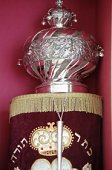|
SCHOOL OF BIBLICAL AND JEWISH STUDIES
OF HADAVAR MESSIANIC MINISTRIES
"The HaDavar
(The Word) school is geared to provide high quality Biblical
and Jewish studies to any Christian who wants to
grow in the Word of God." It offers extensive
low cost live studies at Irvine Community Church,
Irvine, California and invites you to contact them at
Hadavar Messianic
Ministries.
The Association of
Messianic Congregations is privileged to present the complete
set of online studies offered by the HaDavar School of Biblical
and Jewish Studies. Links to previous studies in the series may
be found in our
Library
and
Sound
Doctrine pages.
*
SECTION 1:
GETTING TO KNOW GOD
STUDY 3: SHARING
SEYCHEL
By Robert Morris
*
"When
you are witnessing to a Jewish person, you must be
sensitive
to the fact that you are involved in a
cross-cultural ministry."
“Seychel”
means common sense, wisdom, or sharp thinking. When you
are witnessing to a Jewish person, you must be sensitive
to the fact that you are involved in a cross-cultural
ministry. Please do not be intimidated by this
information. Just keep it in mind as you witness. The
more religiously observant the Jewish person is, the
more these items apply; the less religiously observant
the Jewish person is, the less they apply. Go for it!
1. The number one reason why a Jewish person will
hesitate to accept Jesus as Messiah is caught in the
statement, “I don’t want to stop being Jewish.”
Click Here for a detailed response to this objection.
2. If you know the pronunciation of
God’s personal, memorial name (YHVH), please do not
pronounce it.
3. When talking about God it would be advisable to use
the phrase, “the God of Abraham, Isaac, and Jacob”. The
Lord or Hashem are fine terms to use as well.
4. Be sensitive and polite. This may seem incredibly
obvious; however, I have met far too many believers who
are insensitive, rude, and impolite when they witness.
5. Terminology: Using appropriate terminology
will do much to facilitate communication and bring down
barriers of misunderstanding.
| Instead of saying: |
Use: |
| Christian (as a description) |
Messianic, Biblical, or Scriptural |
| Christian (as identification) |
Messianic, Believer |
| Christ (Anglicized Greek) |
Mashiah (Hebrew), Messiah (Anglicized
Hebrew) |
| Church |
Congregation |
| Jesus (Anglicized Greek) |
Yeshua (Hebrew) |
| “Died for my sins” |
“Atoned for my sins” |
| Holy Spirit/Ghost |
Spirit of God, Ruach HaKodesh (Hebrew) |
| Trinity |
Compound unity, Triunity, Triune nature |
| Gospel (transliterated Greek) |
Good News (English) |
| Easter |
Resurrection Day |
| Christmas |
Messiah’s birth |
| New Testament |
New Covenant, Brit Chadashah (Hebrew) |
| Old Testament |
Tenach, Hebrew Scriptures, Bible |
| Baptism (Anglicized Greek) |
Immersion, Tevilah (Hebrew) |
| Cross |
Tree |
| Convert/conversion |
Turning, completion, repentance |
| Second coming of Christ |
Return of the Messiah |
| Blood of Christ |
Death/substitutionary sacrifice of Messiah |
6. Avoid telling jokes about Jewish
people. A Gentile telling Jewish jokes is often
interpreted as anti-Semitism. Tell jokes that are
neutral in nature or tell jokes about you. To avoid any
misunderstandings let a Jewish person tell the Jewish
jokes.
7. Avoid criticizing Jewish leaders. A Jewish person
might take your remarks to be anti-Semitic. Let Jewish
people criticize Jewish leaders.
8. Avoid calling yourself a “spiritual Jew”. This term
will simply confuse the Jewish person. Just as a matter
of clarification: while Gentile believers in Yeshua are
“grafted in”, they do not become Jewish just as Jewish
believers do not become Gentile. There are no
distinctions between Jew and Gentile in respect to
salvation and sanctification; however, the distinction
does remain in respect to heritage (just as it does in
respect to gender).
9. Avoid anti-Semitic terms, ideas and beliefs. Don’t
dodge the issue of “Christian” anti-Semitism. Don’t let
yourself be intimidated by the actions of others. You
are not responsible for them, only for yourself. Educate
yourself about the atrocities of the past and personally
repudiate them.
KEY
The key to sharing the gospel with Jewish people is
found in the words of the Apostle Paul in I Cor. 9:20:
|
“To the Jews I became as a
Jew, so that I might win Jews; to those who
are under
the Law, as under the Law though not being
myself under the Law,
so that I might win those who are under the
Law.” |
In other words, EMPHASIZE THE
JEWISHNESS OF YOUR FAITH! Facts you can bring out
are: “Jesus was Jewish,” “Jesus spoke to a Jewish
audience,” “Jesus’ disciples were Jewish,” “the
first believers in Jesus were Jewish,” or “the New
Testament was written by Jewish writers.”
SCRIPTURES TO USE
-
Isaiah 52:13 through chapter 53
Messiah suffered to atone for our sins. Note: The
“Servant” could not be Israel as some contend,
because in verse 8, you have “My people” (which
could only be Israel!) and “He” in the same phrase.
In addition, overall, the nation of Israel does not
fit the description of the Servant. Note: The Spirit
of God has used this chapter to bring more Jewish
people to Jesus than any other passage in the Hebrew
Scriptures.
-
Isaiah 9:6, 7; Psalm 2:7, 8;
Proverbs 30:4
Messiah will be the Son of God.
-
Micah 5:2-4
Messiah’s birthplace is foretold, and He was to be
“from everlasting.”
-
Zechariah 12:9-10
Both of Messiah’s comings appear in this one verse.
The ancient Jewish rabbinic writing, the Babylonian
Talmud (Sukkah 52a), states: “the cause of the
mourning is the slaying of Messiah.”
-
Isaiah 42:6; 11:10; 49:6
Messiah will be a light to the Gentiles.
-
Daniel 9:26
Messiah will be cut off before the destruction of
the second temple in 70 AD.
-
Zechariah 9:9-10
Messiah will come to Jerusalem having salvation, yet
He is humble and mounted on a donkey.
Most Jewish people are not used to
reading the Bible. Scriptures that are bursting with
meaning to you will, most likely, not be understood by
them upon their initial reading. Make sure that they
understand the passage. How? By asking them questions
about the passage and/or paraphrasing the verse after
reading it with them. Many believers are unaware of just
how little most Jewish people know about their “own”
Bible. Most of them do not know that Isaiah or Jeremiah
are books of the Hebrew Bible. Therefore, when
presenting a passage like Isaiah 52:13-53:12, we must
tell them that this is a passage from the Hebrew Bible,
written by the Jewish prophet, Isaiah, in 700 B.C.E. Do
not tell them where the passage is from until after they
have read it and have answered the question, “Who do you
think this is talking about?” It is most effective if it
is used in this manner.
TWO OF THE MOST OFTEN
HEARD JEWISH OBJECTIONS
Objection #1:
|
The Messiah is supposed to
bring world peace. There are still plenty of
wars.
Since Jesus did not bring world peace,
He cannot be the Messiah. |
Answer:
There are two facets of the Messiah. One facet concerns
the “Reigning Messiah,” and one facet concerns the
“Suffering Messiah.” Both facets have to be accounted
for when we consider the concept of the Messiah. It is
true that the “Reigning Messiah” will bring in a time of
universal peace and prosperity. However, that is only
half the picture. One-half of the description of the
Messiah has been left out. The other half of the picture
shows us a Messiah who suffered and died on behalf of
Israel and all mankind. This is the facet of the Messiah
that Jesus fulfilled during His First Coming. At the
Second Coming, Jesus will fulfill the predictions that
the Messiah will bring in world peace.
Our ancient Rabbis did not understand how these two,
apparently contradictory, pictures about the Messiah
harmonized. Their solution was the “Two Messiah Theory.”
They looked for two Messiahs to come. The first would be
“Messiah ben Joseph” (Messiah son of Joseph), the
Suffering Messiah. He would suffer and die during the
wars of Gog and Magog. The second Messiah, Messiah ben
David (Messiah son of David), would follow him. This
would be the Kingly Messiah who would conquer Israel’s
enemies, rebuild the Temple, and bring in a time of
universal peace. However, the New Testament provides us
with a more elegant and straightforward harmony of the
biblical material. Instead of two Messiahs, each coming
once, there is one Messiah coming twice. Yeshua is the
Suffering Messiah as well as the King Messiah.
Scripture texts to show the validity of this position
would be Isaiah 52:13-53:12, Zechariah 12:10, and Psalm
22:16. Someone cannot be true to the picture of the
Messiah that is drawn in the Hebrew Scriptures if they
leave out Messiah’s sufferings. A good resource to have
on hand is the book The Messiah Texts by Raphael
Patai. Dr. Patai, an unbelieving Israeli, devotes an
entire chapter to the concept of the “Suffering
Messiah.”
Objection #2:
|
How could Jesus be the
Messiah? Look at what his followers did. The
Christians
have persecuted and killed the Jewish people
down through the centuries. |
Answer:
You must show your Jewish friend the difference between
a true Christian and one in name only. It is possible to
wear the label “Christian” and not be one. Bring out the
fact that many people follow an historical religion, but
do not know God personally. Show them that Yeshua dealt
with this exact problem in His day by quoting Matthew
7:22-23, Many will say to Me on
that day (the day of judgment), "Lord, Lord, did we not
prophesy in Your name, and in Your name cast out demons,
and in Your name perform many miracles?"And then I will
declare to them, "I never knew you; depart from Me, you
who practice lawlessness.” Yeshua will
condemn phony “Christians.”
It would be instructive to point out the parallel
between what Yeshua said and what Jeremiah said in
Jeremiah 23:14. Also among the
prophets of Jerusalem I have seen a horrible thing: The
committing of adultery and walking in falsehood; and
they strengthen the hands of evildoers, so that no one
has turned back form his wickedness. All of them have
become to Me like Sodom, and her inhabitants like
Gomorrah. Jewish people can follow an
historical religion and not have a personal relationship
with the God of Abraham, Isaac, and Jacob. God will,
likewise, condemn hypocritical Jews.
Now you have the opportunity to tell them that a true
Christian is a “Follower of the Messiah” (that is the
meaning of the word Christian). In order to be a genuine
“Follower of the Messiah” one must have a spiritual
birth from the God of Abraham, Isaac, and Jacob. Then
take them to John 3:1-21 where Yeshua discusses all of
this with a leading Jewish Rabbi. The result of being
“born again” is that a genuine Christian will support
the Jewish people because his Savior is Jewish. Finally,
the very job description of the Messiah lies in the fact
that He loves and supports the Jewish people. He does
not persecute them.
Thanks to Israel Opportunities for the Sharing
Seychel presented on
http://www.hadavar.org/getting-to-know-god/sharing-seychel/.
*
Copyright © 2013 HaDavar
Messianic Ministries.
Permission granted for reproduction without changes and
with proper accreditation.
*
Sharing Seychel may
be read in its original format at
http://www.hadavar.org/getting-to-know-god/sharing-seychel/.
A complete list of HaDavar studies may be
found at
http://www.hadavar.org/.
*
|
In 1981, Robert
Morris established the Beth Ariel Center in Seattle,
Washington, and served as its director for three years.
In 1988, he completed a Masters of Divinity program with
a concentration in Jewish ministries at Western
Conservative Baptist Seminary. In 1989, he planted
Kehilat Ha-Mashiach (Congregation of the Messiah), a
Messianic Jewish congregation in Portland, Oregon, and
watched it grow from 15 to 140 people over a period of
seven years while seeing a steady number of Jewish
people come to faith in Yeshua. During that period, he
also served as a Bible camp director/teacher and as a
conference speaker in the United States, Russia,
Germany, and Israel. In 1997, Robert become Ariel
Ministries Executive Director where he reorganized the
ministry, began and directed Ariel’s Department of
Missions and Training, and served as an Ariel Field
Representative. In March 2001, he founded HaDavar
Messianic Ministries in Irvine, CA., where he serves as
pastor while simultaneously supporting evangelistic
activities on college campuses and training local
Messianic fellowships, Messianic congregations, and
conventional churches.
HaDavar's home page is at
www.hadavar.org.
|
*
Return to Home Page

|


